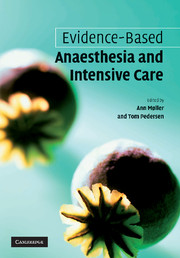Book contents
- Frontmatter
- Contents
- Foreword
- Contributors
- 1 Introducing evidence-based anaesthesia
- 2 How to define the questions
- 3 Developing a search strategy, locating studies and electronic databases
- 4 Retrieving the data
- 5 Critical appraisal and presentation of study details
- 6 Outcomes
- 7 The meta-analysis of a systematic review
- 8 Bias in systematic reviews: considerations when updating your knowledge
- 9 The Cochrane Collaboration and the Cochrane Anaesthesia Review Group
- 10 Integrating clinical practice and evidence: how to learn and teach evidence-based medicine
- 11 Involving patients and consumers in health care and decision-making processes: nothing about us without us
- 12 Evidence-based medicine in the Third World
- 13 Preoperative anaesthesia evaluation
- 14 Regional anaesthesia versus general anaesthesia
- 15 Fluid therapy
- 16 Antiemetics
- 17 Anaesthesia for day-case surgery
- 18 Obstetrical anaesthesia
- 19 Anaesthesia for major abdominal and urological surgery
- 20 Anaesthesia for paediatric surgery
- 21 Anaesthesia for eye, ENT and dental surgery
- 22 Anaesthesia for neurosurgery
- 23 Cardiothoracic anaesthesia and critical care
- 24 Postoperative pain therapy
- 25 Critical care medicine
- 26 Emergency medicine: cardiac arrest management, severe burns, near-drowning and multiple trauma
- Glossary of terms
- Index
5 - Critical appraisal and presentation of study details
Published online by Cambridge University Press: 05 September 2009
- Frontmatter
- Contents
- Foreword
- Contributors
- 1 Introducing evidence-based anaesthesia
- 2 How to define the questions
- 3 Developing a search strategy, locating studies and electronic databases
- 4 Retrieving the data
- 5 Critical appraisal and presentation of study details
- 6 Outcomes
- 7 The meta-analysis of a systematic review
- 8 Bias in systematic reviews: considerations when updating your knowledge
- 9 The Cochrane Collaboration and the Cochrane Anaesthesia Review Group
- 10 Integrating clinical practice and evidence: how to learn and teach evidence-based medicine
- 11 Involving patients and consumers in health care and decision-making processes: nothing about us without us
- 12 Evidence-based medicine in the Third World
- 13 Preoperative anaesthesia evaluation
- 14 Regional anaesthesia versus general anaesthesia
- 15 Fluid therapy
- 16 Antiemetics
- 17 Anaesthesia for day-case surgery
- 18 Obstetrical anaesthesia
- 19 Anaesthesia for major abdominal and urological surgery
- 20 Anaesthesia for paediatric surgery
- 21 Anaesthesia for eye, ENT and dental surgery
- 22 Anaesthesia for neurosurgery
- 23 Cardiothoracic anaesthesia and critical care
- 24 Postoperative pain therapy
- 25 Critical care medicine
- 26 Emergency medicine: cardiac arrest management, severe burns, near-drowning and multiple trauma
- Glossary of terms
- Index
Summary
The critical appraisal of studies and the succinct presentation of study details are essential aspects of evidence-based anaesthesia. Their primary role is to guide the interpretation of evidence from studies in terms of its validity and applicability. It is necessary to be aware of potential sources of bias that may impact on the reliability of study findings. Similarly, it is important to consider key study characteristics that may affect the relevance of study findings to clinical practice. Formal procedures, such as the use of forms itemising criteria to judge study quality and for the collection of study details, are important to make the process objective and repeatable. There is an underlying need for transparency in methods and reporting.
Introduction
The critical appraisal of studies and the systematic presentation of study details are key components of an evidence-based approach. Both require methodical processes, which should be pre-specified and, where appropriate, piloted. The importance of a written protocol, which includes details of these, cannot be overstated. The preparation and piloting of forms to assess study quality and to gather study details and results are of immense help (see Chapter 4). Similarly of benefit is an outline, which may include draft tables, of what you want to report.
Keywords
- Type
- Chapter
- Information
- Evidence-based Anaesthesia and Intensive Care , pp. 28 - 38Publisher: Cambridge University PressPrint publication year: 2006



